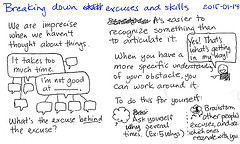Never make Excuses!
Excuses avoids responsibility! When you fail, do you make excuses? Do you take responsibility for your actions or blame others? What is your excuse for poor performance? Excuses keep you from looking at the real problem! Excuses will make you give up! Do you start out with good intentions and tolerate poor results? No one ever excused his way to success. (Dave Del Dotto) Why?
Background
I wrote an article about successful and unsuccessful people which states successful people make no excuses and unsuccessful people blame others for their misfortune. Taking responsibility for your actions will help you achieve success. Blaming others is a much easier answer even if it does not solve the problem. Is this a learned response? It gives the appearance of relieving the person of responsibility. Children learn this early if the parents accept it.
Accepting or excusing poor performance is very negative and far reaching. As a child, you probably heard your parents blame the boss or economic conditions or the weather for why they cannot achieve results. It may even be valid, but it should not stop them. In my home, the improbable occurred! I had parents who should not succeed, but did. They never accepted their plight and overcame every obstacle. They never let anything stop them from success.
My Background
Growing up in my parent’s home meant there were no excuses for poor performance! They never made excuses for poor performance. My parents like many others came to this country as immigrants and built businesses in the least likely time. Owning a successful business is an accomplishment at any time. They did it during the Great Depression! They built a custom home in 1929 and took on a huge mortgage in their day of $85 per month. This was during a time when the common wage was $20 per week.
Early Years
This “can do” home environment was everywhere! I was expected to do my best in everything I did. I had lots of practice because my parents took me to meetings and I saw how they performed. If that was not enough, I worked with them (for free) from as early as I can remember. On Saturdays, I would go to my mother’s store and did little tasks around the store. I saw how she worked tirelessly and learned a lot. I learned failure was never an option. I was expected to help and perform well.
I learned responsibility and discipline very early in life. The responsibility came from the tasks I was assigned and discipline came from the expectation that I had to perform. I never thought about it at the time, it was just expected of me. Discipline is probably one my strong suits and it helps me complete tasks. Holding me accountable meant I was on the line for completing the task or goal. It changed how I responded to challenges and I started to feel that I had more control over myself. Was that independence?
What came next were goals and setting more goals! Setting goals and creating plans to achieve them were second nature! This was my opportunity to learn soft skills. Soft skills are personal attributes such as work ethic, dependability, interpersonal skills, critical thinking, integrity, negotiation and leadership to name a few. These skills help me succeed where others do not. I tend to lump them together and call them determination.
I learned that excuses were never acceptable because my parents never would accept them. I would set goals and achieve them! The more I accomplish the more I can accomplish. Success gives more success because I learned how to succeed. Why would I make excuses? I set out to lose weight and I succeed!. Was it easy? No, but I practiced for a lifetime. Did I always succeed? No, sometimes I failed, but I keep trying.
Final Thoughts
Making excuses is just a way of not taking responsibility. Blaming others means you are not accountable. The acceptance of excuses means failure is acceptable. It is persistence that overcome failure not excuses. When excuses are acceptable, we are accepting failure. Do you make excuses? Are they acceptable? Start off 2012 the right way and hold yourself accountable. Set goals, monitor your progress and adjust your efforts. What are you going to do? Excuses avoids responsibility!
Photo by: Flickr
SOURCE: KrantCents – Read entire story here.
